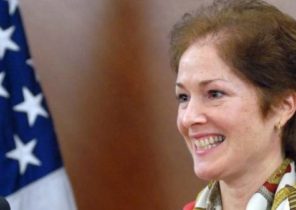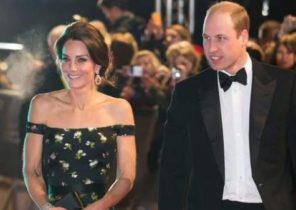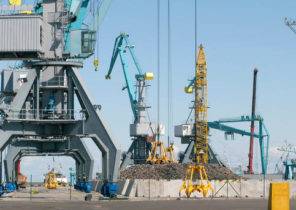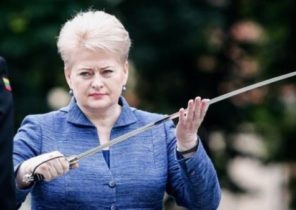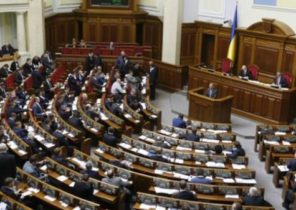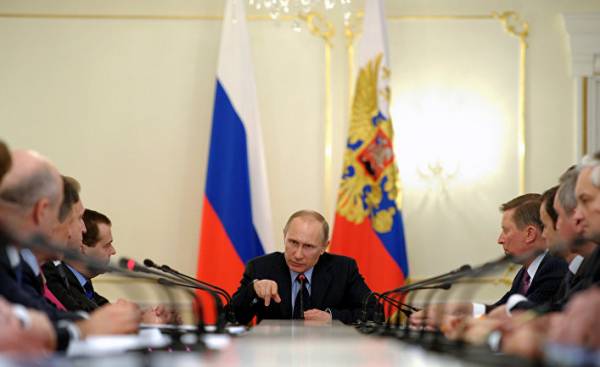
Four years after the election of Vladimir Putin for a third term inside the political regime started a process of radical personnel restructuring. Waves have permutations affected the administration of the President, governors, law enforcement agencies, state corporations. In the years 2017-2018 will be a new wave in connection with the presidential election imminent shake-up of the government. Mode before experienced a major reshuffle, but never before have they been a reflection of the deep political and even psychological transformations of the elite. If personnel changes in 2004, 2007 or 2011-2012 could be called a controlled adaptation, the same processes observed in 2016-2017-m, indicate a significant change in the system of government.
PERSONNEL CHANGES OF THE PUTIN ERA AND THEIR FEATURES
The political regime of Vladimir Putin, which has started his term in 2000, went through major personnel upheavals, however, at this stage we are talking about something completely new.
The first major reshuffle, which was decided by President Putin, took place only in 2003 and 2004, and concerned the end of the “transition period”. In late 1999, Putin took over covert political commitment to save the staff of the presidential administration and the government before the end of his first term, thereby ensuring the continuity and safety policy of Boris Yeltsin and his family.
Changes, however, occurred somewhat earlier than the promised four years as a result of the Yukos case and the overall policy of “equidistant” oligarchs from the state. Hard line politically influential big business was one of the first reasons of conceptual conflict, the new Putin government with the liberals of the Yeltsin era and accelerated personnel rotation. At the end of 2013 — beginning of 2014 was a new government and the new administration, however, this was more the legitimization of the already running process. For example, the head of the presidential administration in 2003, was Dmitry Medvedev, the de facto former right-hand of Putin in the informal hierarchy of the administrative system of governance. In General, the permutation 2003-2004 drew a line under the process of staffing the expansion of Putin and “Petersburg”, as they were called: the President has created a comfortable environment control, starting mainly from the principles of loyalty of appointees and their personal devotion. In those years it was connected with the political objectives of the regime: strengthening “vertical”; political control over key positions, institutions, processes. This expansion continued until 2007, when close to Putin supporters took up positions at all levels of public administration, as well as in the public sector of the economy (or the companies associated with the government).
The second wave of personnel changes was observed in 2008 in connection with the implementation of operation “successor”: the head of state was elected Medvedev, Prime Minister Vladimir Putin. Despite the significant number of personnel changes the period on the formation of the new conceptual nature of the mode of the question. During the 2008-2011 years, there has been limited expansion of Medvedev’s people, but it was all part of a temporary, reversible circuits redistribution of power.
Finally, the third wave can be observed in 2011-2012. Putin was again elected President of Russia, Dmitry Medvedev, became Prime Minister. Many Ministers joined Putin in the presidential administration and the Cabinet of Ministers has adopted a more technocratic view. It was a period of expansion of the Medvedev legacy, conservative, reform and even reaction. Personnel policy then, after the abolition of the tandem, was almost completely monopolized by the President.
On personnel changes of the time affected not so much the presidential election, how many mass protests of late 2011 — early 2012, has become one of the main reasons for care in the government of curator of internal policy of presidential administration Vladislav Surkov and appointment to its place Vyacheslav Volodin. It was one of the rare conceptual important decisions Putin related to his personal attitude to management. Volodin, as chief political strategist of the campaign of Putin, was at that time more popular than Surkov, lost in the eyes of the future President’s political uniqueness (convergence with Medvedev, sympathy for the “angry urban class”).
As you can see, all three waves were tied in time for the presidential elections and to some extent pre-programmed regime. It was a period of managed adaptation to the institutional and political changes, stemming from the needs of the government.
Personnel changes 2016-2017 began long before the presidential elections and was not directly tied to the future transformation of government. In addition, they were largely compelled to regime, as has not been caused by new requirements, as by the growing management crisis. Therefore, the reshuffle of 2004, 2007 or 2012 are also similar to the present, as a steady flow of water — a tsunami. And it would be more correct to speak not about permutations, and about personnel fracture 2016.
PREREQUISITES PERSONNEL FRACTURE
There are two main reasons that have led to deep staffing upheavals of 2016. One of them is inertial in nature and were originally laid by the logic of mode. The second was the result of the external shock and has played a catalytic role in the reshuffle.
After returning to the presidency in 2012, Vladimir Putin started the process of “restoration”, in fact, started in September 2011 (revision of Medvedev’s heritage, power, revenge, conservative, reform) and, in fact, replacing the public administration. The role of the government was reduced to inertia, local, technical half-measures. For 2012-2013, the Cabinet of Ministers has not adopted any major management decisions, the economy experienced a decline, and all discussion was limited to the issue of implementation (or rather, failure) of the “may decrees” Putin signed immediately after the election and built on his pre-election promises. At the same time returning the old control logic used in 2006-2007: creation of state corporations (Corporation “Rosatom” Corporation control of Siberia and the Far East, the housing Corporation) and manual control.
Thus slowly, without any shocks within the regime created the preconditions for its depreciation, which was reflected in the high degree of corruption, the extremely low efficiency, inability to make important management decisions (even long-term development strategy of the country in the beginning of the third term of Putin was not ultimately adopted). This wear mode is similar to the aging process seems invisible, but manifested in reduced efficiency, dynamism, ready to upgrade, fear of change. At the end of 2013, it was possible to talk about the features of managerial impotence state, accompanied also by accumulation of contradictions between the President and the government (the rumors about the resignation of Medvedev then widely discussed). This managerial impotence could last a very long time, leading to updating of the regime or its death. Managerial incompetence and was the first cause, laid the basis for future staffing of the perturbations.
In 2013, it seemed that significant updates to the inertial regime can exist for many years without noticeable oscillations. Margin looked very convincing. But 2014 was the hardest for Russia fracture resulting from a geopolitical crisis. The new Ukrainian revolution, the subsequent annexation of the Crimea; the first wave of sanctions; then downed the Boeing 777 and the second, much more painful wave of sanctions, strong and protracted fall in global oil prices; reasonable isolation and cut off access to global financial markets — all this was for Russia to be a disaster.
It is difficult to say what would have happened if not for the Crimea. However, it is safe to say that the events of 2014 have significantly increased management burden on the regime and demanded more efficiency. An unprecedented challenge for the state and the political regime was further complicated by declining resources. Hopes for a recovery in global oil prices and the lifting of sanctions were not justified, and the bad of foreign economic and political conditions will become a permanent factor and a new reality.
Vladimir Putin took a year or two to “digest” this new reality and come to terms with the new situation in Russia and largely to alter their own principles of personnel policy. In 2014-2015, the country has moved to a new track, “war”, being involved de facto in two campaigns in the East of Ukraine and in Syria. This required not only more dynamic but also the mobilization of all forces, as well as the search for more adequate mechanisms and forums for discussion and decision-making. Instead of the government key management issues began to preoccupy the security Council. The FSB has significantly expanded its role in the legislative process. Dramatically increased the role of the Ministry of defense, military and even to some extent, began to supersede diplomats from the foreign sector. “Big politics” for Putin firmly focused on Ukraine and Syria, whereby the vacuum in domestic politics. The state administration has routinizable, Putin is less likely to intervene in disputes or paid attention to issues of governance. Gradually over 2014 and 2015 was formed a management “-” management and “swamp”. First daily and dynamically engaged in questions of security and foreign policy in the second accumulated problems.
All this led to a major staffing change that began in 2016 and has affected virtually all levels of political and public administration. Personnel changes 2016-2017 can be divided into three types: conflict, clan and technocratic.
CONFLICTS — A NEW DRIVING FORCE FOR CHANGE
A feature of Vladimir Putin’s policies in 2000-2014 has been that he did not like to wash dirty linen in public, preferring to resolve conflicts within the elite without much noise and often personal involvement. Such clashes, often extremely sharp and dangerous (for example, the power of war in 2005-2006, or the clash between progressives and conservatives in 2011), took place throughout his reign. However, the groups did not hurry to abuse the conflict for political expansion, and the President always tried to fulfill the role of arbitrator and only in situations where differences between groups of interests went too deep strikes or weaken both sides. The conflicts of the past years were often of a horizontal nature, i.e. concerned players of relatively equal governmental regulations (the”Gazprom group” against “Sechin”, FSB vs FSO, etc.).
The peculiarity of the new period was the significant increase in conflicts of a vertical nature, which is associated with the formation of structural vnutrirezhimnye imbalance in favor of the security of the state, especially the security services. In addition, the FSO, which for many years was politically opposed to the FSB, has lost its former status and was “neutralized”. From it were derived all influential associated with Putin’s staff, and the FSB in a sense was granted political advantage.
The large number of conflicts personnel changes 2016 was associated with increased activity of the 6th service of Management of own safety of FSB, which initiated many of the investigations that were primarily smuggling and customs Affairs. So, the criminal case against the large St. Petersburg businessman Dmitry Mikhalchenko has accelerated the resignation of the head of the SSF Evgeny Murov, who, according to numerous leaks to the media, openly patronized his businesses. “Customs” was one of the main reasons for the searches the head of the Federal customs service Andrei Belyaninov, then forced to leave his post. Along with this, major changes were made and within the FSB: dismissed influential employees, including the head of service of economic security, who were suspected of “protection racket” of the smuggling business, in particular the company’s Global ULS. Chapter USB Sergei Korolev was appointed the head of the SEB, thus effectively absorbing the competing structure within the FSB.
Competition of interest groups within the FSB has also led to high-profile criminal proceedings against influential investigators of the RCDS (a case involving a thief in law Shakro Young), which was a major blow to Putin’s classmate Alexander Bastrykin. A number of generals were arrested and an official investigation Committee Vladimir Markin has joined the company RusHydro in the sphere of influence of the head of “Rosneft” Igor Sechin. In “Rosneft” — though only for a few months — in August 2016 passed and the curator of the 6th service, CSS, CSS Deputy Director General Oleg Feoktistov.
Finally, it is the political “neutralization” of the FSO led to the exit out of the whole set of frames. In 2015, the FSO has left the first Deputy Director Alexander Belyakov and the Deputy Director Alexander lashchuk. A native of FSO Alexander Kolpakov replaced Vladimir Kozhin as head of the management Department of the President of the Russian Federation. A former aide of Putin, Alexey Demin came to the post of head of the Tula region by the defense Ministry (probably the Minister did not work). Another representative of the FSO Dmitry Mironov worked for some time as Deputy Minister of internal Affairs, and then moved to the post of Governor of the Yaroslavl region. Finally, another aide of Putin’s FSO, Eugene Zimichev, who had been some time in the post of head of Kaliningrad, the FSB, was appointed Governor of the Kaliningrad region. However, to hold it could not and then took the leadership of the FSB.
Personnel the outcome of the FSO, mistakenly taken by many for the expansion of the “siloviki”, it is nothing like the disbanding of the original team Murov — Zolotova in a situation of considerable growth of influence and the expansion of competitor FSO — FSB. For Putin’s personnel policy, this means that there is not a promotion of skilled managers and the employment of people who found themselves unnecessary after the weakening and dissolution of the SSF period Murov. Such a “dissolution” were voluntary-coercive and formirovalas “security officers”.
Institutional personnel the result of a long conflict between the FSO and the FSB was the introduction in April 2016 of Regardie headed by former head of the presidential security Service and former commander of internal troops of the MIA of Russia Victor Zolotov. The appointment of Viktor Zolotov, head of the Federal service of the National guard seemed natural: for the past two years he has headed the internal troops, which became the basis for Regardie. Gold is one of the most close to Putin in the security forces. In 1990-e years he worked in the protection of the mayor of St. Petersburg Anatoly Sobchak, where he met with the Deputy mayor Vladimir Putin, with whom they also worked together on judo. Gold then was the chief guard of influential businessman Roman Tsepov, the owner of the security company “Baltic-escort”, to provide the relevant service authorities. At the head of the presidential security Service (SBP), where he was from 2000 to 2013, gold memorable participation in clan wars, power structures: in the mid-2000s, the fierce competition between the FSO (Evgeny Murov), SBP, Federal drug control service on the one hand and the FSB and Prosecutor General’s office on the other. Also gold is considered as a hardware ally Ramzan Kadyrov.
Gold has formed a new power center of influence, which is gradually replacing the FSO to its previous political role of counterweight to the FSB (it is clear that in functional terms Regardie and the FSO do not replace each other). It was one of the rare Mature examples of the Putin regime political appointments: we are talking about the formation of a new power resource, essentially counter-revolutionary structure, whose powers overlap with the interior Ministry, and FSB. In a sense, this emergency troops in case of mass protests, riots, terrorist attacks or other security attacks, and subordinate directly to Putin. Thus, the expansion of security forces is complemented by institutional changes that allow the regime to mobilize its resources in case of destabilization.
Conflict can also be called and the resignation of the governors have become involved in criminal cases. The Governor of the Sakhalin region Sergey Khoroshavin, head of the Komi Republic Vyacheslav Gaizer, Governor of Kirov region Nikita Belykh, the head of Udmurtia Alexander Solovyov, head of the Mari El Republic Leonid Markelov… never before in Russia were not so many criminal cases filed against the current or just taken the governors. If in the past such cases were exceptional and was the result of a local conflict, but now we can say about the trend: the Governor’s office is one of the most vulnerable to potential criminal prosecution. A growing number of such prosecutions means that the problem has ceased to be local and received Federal value. For each of the criminal cases against the governors, as a rule, the FSB, and the processes themselves are often demonstrative.
The activity of the FSB was accompanied by a media campaign, where the representatives of the service on condition of anonymity, told media that on the eve of elections has received carte Blanche in the fight against corruption; that they will show all rules that will apply at least until the presidential election. FSB began to imagine itself the exclusive power to help the head of state to restore order. In fact, it is about the attempts of the FSB to take the same managerial vacuum in the country, formed after the outbreak of the geopolitical crisis. And this activity was not suppressed by the President, and perhaps even received his sanction.
One of the important reasons for the growth of conflict within the elite has been the weakness of state institutions, especially the Federal government, which in the third term Putin has reduced its managerial capacity. The initiative for the adoption of key decisions in economic policy were taken up by other structures and sites — of the Central Bank, security Council, FSB, presidential meetings and councils.
In this sense, is not accidental arrest of the current Minister of economic development Alexei Ulyukayev in November 2016 — an exceptional case in modern Russia. The case, initiated at the request of the Executive Director of “Rosneft” Igor Sechin, showed deep political vulnerability and the Prime Minister, and his subordinates before the informal opportunities close to Putin figures. Moreover, in this situation it is important to pay attention not only to the fact of the arrest, but to prepare the criminal case: as reported by the Russian press, the Minister and his other colleagues, as well as senior executives of the presidential administration auditioned FSB for over a year.
The arrest of the speaker revealed a set of conflicts based on ideological and institutional contradictions. The first was a conceptual disagreement between supporters and opponents of the nationalization of the Russian economy. The speaker, like the government in General, opposed the sale of “Bashneft”, considering it’s supposed privatization (after all, “Rosneft”, in fact, remains a state-owned company, although the control of the state indirect — through “Rosneftegaz”). Sechin insisted on the formal approach and the right to Rosneft to purchase the asset. The reason for the criminal prosecution of the speaker was, according to investigators, the extortion Rosneft bribe for a positive decision on privatization of “Bashneft”. However, in reality, the attack Sechin underlined the incapacity of the government as an institution of power.
The resignation of the speaker exemplifies the conflict personnel decisions and evidence of growth within the regime of structural and ideological imbalances when the formal powers and prerogatives to overcome more powerful players in a forceful way. And the motives of players are stimulated sharply aggravated the need for reducing resources.
Institutional contradictions, in this case manifested in the relevant distortions when legitimate authority that implements the state policy, politically loses its functions and is devalued. The head of the Cabinet of Ministers and members of the government are under a strong pressure from players with direct access to Putin and has access to the power resource.
All this leads to growth in staff instability and provokes the acceleration of the rotation, where personnel of the least politically protected (the governors and the government), or where there is strong competition for power and resources (the war between the security forces).
ROTATION OF INNER CIRCLE
Along with the General increase of conflicts within the state government in the last two years, there is another powerful factor rotation of elites, which is likely to remain relevant in the near future. This is a new trend — leaving close to Putin allies with influential positions in the position, formally much weaker.
The first of these truly exceptional event was the resignation of Vladimir Yakunin from the post of head of JSC “Russian Railways” in 2015. At that time it seemed something incredible: still Vladimir Putin didn’t fire their friends in this way. Moreover, Yakunin, as reported by “Kommersant”, failed to satisfy his payment — the post of Vice-speaker of the Federation Council (supposedly this was opposed by Valentina Matvienko). A Senator, the former head of “Russian Railways” was not satisfied. After the resignation Yakunin focused on the Institute “Dialogue of civilizations”, but the mainstream of politics, he almost fell.
In 2016, the number of resignations of people close in varying degrees to Putin raised: the head of the FSO Yevgeny Murov (though his departure was long planned), the head of VEB Vladimir Dmitriev, Director of the Federal customs service Andrei Belyaninov, head of the presidential administration Sergei Ivanov… To all of them for different reasons Vladimir Putin had a claim which has acquired a crucial relevance at the turn of 2015-2016. Moores was removed by age (retirement was expected in 2015), but the care of officials was arranged so that ruled out his participation in the selection of a successor, and in the FSO made a personnel clearance. Vladimir Yakunin was fired amid a long-running struggle with the government for subsidies, despite the fact that the economic situation of the “Russian Railways” has remained dismal and the Kremlin was forced to seek a more effective leader. Change the head of VEB was the result of too risky policy of the Institute of development, to give knowingly bad loans, as a rule, politically important projects (e.g. construction of sports facilities for the Olympic games in Sochi). Finally, Andrei Belyaninov was forced to leave his post as head of the FCS, when the development received high-profile criminal case connected with abuses at customs.
As can be seen in each of these cases, the Kremlin had a significant claim to the retirees, it was mainly related to extreme inefficiency or neglect of important critical issues in the professional field. However, there is no reason to say that this failure appeared only in the years 2015-2017. Questions about the quality of management of the presidential appointees appeared and was one of the most discussed topics throughout the Putin period. This means that the attitude of the Kremlin to his appointees is associated not so much with the quality of their work, but with the transformation needs of the Kremlin, or rather even Putin personally. For the first time in many years, efficiency has become more important to him than loyalty.
The reason for this transformation is also generally clear and linked to the achievement of Putin’s regime a kind of maturity. If for 2000 years Putin was important to carry out personnel expansion and the number one task was the occupation of positions within the system, ensuring its loyalty (it required placing their own, personal extremely reliable in terms of personnel), then to his third term this problem was already completely solved. System in the human, the political sense was homogenized, becoming fully “Putin”. Loyalty in this situation is defined not by personality, but by the system.
In such a situation and the status of “friends” Putin is changing together with the personal attitude towards them on his part. The President’s colleagues lose their uniqueness and indispensability, as well as political value. In the old days the dismissal of a “friend” Putin has always demanded substantial compensation, as well as public honors. Now care is not only routine, but also humiliating: Vladimir Putin is making no effort to protect their colleagues, who are under pressure (as, for example, it was Belyaninov). Depoliticization of the status of friends leads to make them more vulnerable in conflict situations: a criminal case instituted FSB last summer against subordinates Alexander Bastrykin — a classmate of Putin, was the strongest blow on positions of the head of the TFR.
Apart in this series is the resignation in August of last year the head of the presidential administration Sergei Ivanov, formally received the much less influential post of special representative of the President of the Russian Federation on issues of environmental activities, environment and transport. The official reason of resignation — fatigue Sergei Ivanov, which, according to Vladimir Putin, and asked to “hold” him to the position of the head of the AP is not more than four years. Unofficially, in the media appeared two versions. The first is a negative impact on the performance of Ivanov, the tragic death of his son in 2014. Second — Ukrainian sabotage in the Crimea: FSB then caught several citizens of Ukraine, allegedly preparing provocations in Crimea. According to the source “Газета.Ru” Ivanov was removed from the Crimea Oleg Belavencev, who was the first envoy of Putin in the Crimea, and in 2016 was appointed presidential envoy to the North Caucasian Federal district. The interlocutor of the edition reported that “Smith was covering the Department of the FSB in the Crimea, but anything plainly did not penetrate”.
In fact, the resignation of the head of the presidential administration Ivanov’s easy to explain: his real political status as one of the closest associates of Putin ceased to correspond to the positions, which is increasingly losing the actual significance becoming routine and technical. To work in such a post Ivanov was bored, which led to failures, reducing the quality of decisions, local failures in the work.
And this is an extremely important phenomenon: there is a routinization and technocratization state machine. From “vertical” washed out resources for civil servants critical of rising political risks and risks of criminal prosecution, decreases the level of protection, but increases personal responsibility. This also applies to the presidential administration, the government and governors. Because of this political erosion within government vertical the Kremlin picks up on the important positions politically weak figure, technical. The influential players prefer to remain outside the formal competences and responsibilities.
Ivanov’s example perfectly demonstrates the power of this phenomenon: a close associate of President preferred specially created for him the status of special envoy, with direct access to the Kremlin and membership in the security Council as the head of the presidential administration, the real significance of which was low. Ivanov himself but has retained significant influence — he oversees the work of the Kremlin working group on relations between business and law enforcement, lobbying of large industrial projects of Rostec (the construction of incinerators), touches on issues such as the development of the Arctic or Russia’s policy in matters of climate.
It is important to note the trend: the real power and influence are concentrated outside the formal institutions of government, the role of the latter is reduced. So, Putin’s inner circle, preserving or increasing its influence, forming more and more around and not inside the government, where there is a more technical performers.
Associates of Putin, unwilling to take risks of public management, find a more comfortable form of existence in the new reality: management in the state corporations (Sergey Chemezov), Pro-government media (Yuri Kovalchuk), various charities and private companies (the Rotenberg brothers and the “Plato”). But it is important to emphasize that the Kremlin is in such a situation prefers technical workers political heavyweights.
NEW TECHNOCRATS — THE MATURE BASIS OF PUTIN’S POLITICAL REGIME
After the resignation of the influential Putin’s appointees in their place come the figures of technical, uneven predecessors of political weight.
Crises 2014-2015 had a huge impact on Putin’s attitude to the personnel policy. Immersed in the solution of major geopolitical issues, the President became cooler refer to local management challenges. In the context of Ukraine and Syria there is an urgent need to drastically reduce management costs within the country in order to save energy, time and resources. The old management model — together with colleagues — demanded too much attention to settle the feuds, and it took more energy to the discussion and decision-making, and the decisions were difficult. The President acted within the framework of subject-subject relations with those who also claimed the status of informal advisers. The geopolitical crisis led to the fact that the meetings with his colleagues began to pass less often, but contacts with the secret service — on a daily basis.
Formed the new model discussion of solutions — vertical, it is much more comfortable for the President, but the inner circle of the head of state was filled not by colleagues, and going to replace them with workers that ask no questions and are not satisfied with discussions. Changed psychology: between Putin and his subordinates are no more emotional ties and decades spent together, often on an equal footing. Putin moving closer to those who serve him, and moving away from those who, because of their resource claims on the function of co-rulers. The President no longer needs any advice, he needs information and who can without wasting energy to give directives.
This process can be observed in almost the entire vertical of power, and even in influential circles and institutions. So, VEB Vladimir Dmitriev was replaced by a young Manager from the savings Bank Sergey Gorkov, who was to hold the painful clearing Bank. Informed political heavyweight Vladimir Yakunin at Russian Railways was replaced by Deputy Minister of transport Oleg Belozerov. Even in the FSO and SBP in demand figure, far in the personal plan from Putin. The important post came the young Colonel (though quickly received the rank of General) Dmitry Kochnev, the head of the FSO, Oleg klymentyev, the first Deputy head of the Federal security service, Alexei Interim head of URS. And the new head of the administration instead of Sergey Ivanov became his Deputy is a little young Anton Vaino, who oversaw the earlier Protocol.
The arrival of the more technical pieces contributes to the above mentioned devaluation of the official political posts. So, after the arrest of a reputable and well-known business audiences Alexei speaker to choose his successor was not easy: the government had either to greatly expand the prerogatives of the Ministry by making a post attractive to the heavyweights, which wasn’t easy either to look for a weaker Manager. Easier was to go the second way: the speaker has replaced known only to professionals Deputy Minister of Finance — 34-year-old Maxim Oreshkin.
A special case in the process of replacing political appointees with technocrats was the resignation of the first Deputy head of the presidential administration Vyacheslav Volodin, promoted to the post of speaker of the state Duma. Its place when it was taken by the head of state Corporation “Rosatom”, the reformer Yeltsin era, Sergei Kiriyenko.
This personnel rotation looks exceptional and, at first glance, does not fit into the latest trends. So, experienced and influential Sergey Kiriyenko hard to call a technical figure, especially considering his political experience (active party activities in the late 90’s, work in the SPS, the proximity to the Yeltsin liberals), and its adaptation to the Putin regime. And Vyacheslav Volodin, against all trends, has conducted a tremendous job on the politicization of the work of the lower house of Parliament, the growth of the authority of the state Duma. However, despite the apparent exclusivity, both personnel decisions tend to confirm the trends described above.
Sergei Kiriyenko, with all his pronounced political background over the last years evolved from a policy of the Yeltsin era as one of the most important managers of the Putin regime, who managed to work well together as law enforcers and influential groups around the President (for example, Yury Kovalchuk). In the Kremlin invited him not as a former co-chair of the PCA, and as a successful Manager in one of the corporations. A strong style of his work was the desire to reduce conflict in all areas of administration: relations with governors, civil society, the expert community, the “progressive class.” If, for example, created on the initiative Volodina onf to a certain extent, oppose bureaucracy, to the governors of the ruling party, boosting competition for power and resources, Kiriyenko changes the model from conflict to cooperation, which reduces management and political costs in the system of management of internal policy. He also took the line on the ideologization of the work of the office of domestic policy, a departure from the conservative and conservative rhetoric.
At the same time, Volodin, in contrast, politicizes the work of the Parliament. Having entered a new position, he almost immediately began to actively change not only the style, but also the mechanisms of work of the state Duma. It was thought that Parliament should move away from its former reputation “mad printer” and “no place for discussions”. With the aim to improve the quality of legislative work has been re-built expert work of the Parliament, introduced mechanisms for a more thorough examination of bills. Was held and the reform of the state Duma, increased rulemaking requirements of the Cabinet of Ministers.
Thus, the policy together with Volodin has moved to the level of the Parliament, which, however, retains an instrumental role in the adoption of state and political decisions. It turns out the division: inside the Executive vertical policy is superseded, and beyond is valid.
Technocratization is observed at the level of heads of the Russian regions. So, a big wave of dismissals in early 2017 showed that demand has not political appointees, and a neutral bureaucracy. On a post of the Governor of the Perm region, for example, came the head of one of departments of Moscow Maxim Reshetnikov. The Governor of Buryatia Vyacheslav Nagovitsyn was replaced by Deputy Minister of transport Alexei Tsydenov. The head of the Novgorod region Sergey Mitin instead became the head of the Agency for strategic initiatives — young Andrei Nikitin. And the head of Karelia is scandalous and conflict Alexander Khudilainen was appointed head of the Federal service of court bailiffs (FSSP), a classmate of Prime Minister Dmitry Medvedev at the law faculty of the Leningrad state University Arthur Parfenchikov.
And if in previous years the governors promoted the heads of large corporations or the shapes of the inner circle of Putin, now it is in the best case are the governors, to the advice which the Kremlin is listening. So, the head of the Ryazan region Oleg Kovalev instead became the Deputy of the state Duma from “United Russia” Nikolay Lyubimov, who worked several years in the Kaluga region and recommended its Governor Alexander Artamonov.
So popular are the figures, not having much experience of public policy, as well as serious independent political-hardware weight. Is depoliticization of the governors, but at the same time increasing socio-political responsibility of the governors while reducing their status in the power system.
IN ANTICIPATION OF THE NEW HR SHOCKS
In 2016 Putin’s regime is reaching a certain maturity and after going through the trials of geopolitical crisis, began to adapt to a new reality, trying to find opportunities to reduce management costs and improve efficiency. However, in 2017 there are new challenges, heralding a new wave of personnel and structural changes.
Completes a third presidential term for Putin, after which he left the last six years to prepare the country for the transit authority (subject to the rejection of the changes of the Constitution). The Russian establishment in the broadest sense — is well aware that Putin in the next year or two will have to make a decision about his future. The problem of the 2024 are much more complicated, similar to the situation of 2007, when Putin’s in power and age, and General economic conditions was a compelling opportunity to come back in four years.
This means that, whatever the decision, the regime will have seriously to transform, not waiting for the end of the new term. Immediately after the election, if Putin is still going to run, he will have to come to grips with the question of its future. There are three main scenarios, each of which has its podsunuli: stay after 2024, removing the constitutional limit on the number of terms of the Board; to resign as President, but retain his role, making constitutional reform; to transfer power to a full-fledged successor (not Locum Tenens). All of these scenarios require a deep staff rotation.
The transformation of the mode of a priori will occur in the face of declining significance values for Putin, the constitutional foundations of the political system. The geopolitical crisis led to a sharp increase in rates and change in the position of Russia in the world, increase the risk. To change the Constitution in such “military” terms, the logic of the idea of a “besieged fortress”, increasing external pressures and growing chaos in world politics psychologically easier. Russia also fell from among the “Big eight”, the value entered in confrontation with the West, and hence the reputational costs of hard policy reforms will be reduced. To leave in a conflict situation for Putin will be much harder, riskier.
But whatever the course of change in 2018 and subsequent years, will be gradually formed conditions of depersonalization of the Putin regime. The authoritarian role of the individual will be displaced by institutionalization, where for “stability” will to fight is not the President in a personal capacity, and the system he created. A new wave of transformation will inevitably prepare the system for self-preservation after large human and institutional shocks.
